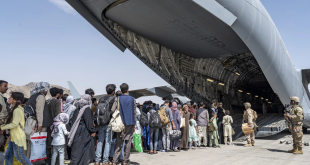AT News
KABUL – Amid the ongoing developments in Afghanistan, a retired NATO supreme allied commander for Europe has come forward to support the United States’ decision to engage in negotiations with the Taliban, despite the uncomfortable nature of such talks.
Recently, U.S. and Taliban representatives held a two-day round of negotiations in Qatar, marking the first dialogue since the Taliban regained control. The discussions revolved around “confidence-building measures,” which included the lifting of sanctions and travel bans, the return of Afghan central bank assets held abroad, addressing human rights concerns, and combating the narcotics trade, according to Al Jazeera.
James Stavridis, a seasoned veteran with almost four decades of service in the U.S. Navy and who held the position of NATO allied commander from 2009 to 2013, took to Twitter to express his support for these negotiations. Despite acknowledging the challenges regarding women’s rights and ensuring the safety of Afghans who aided the U.S. military, Stavridis emphasized the importance of engaging with the Taliban for the greater good.
“While the Taliban’s actions may be deeply troubling, the U.S. is wise to pursue negotiations,” Stavridis tweeted. “With this approach, we can strive to improve the situation for women and girls in Afghanistan and continue efforts to safely evacuate those who supported our mission. Engaging with the Taliban is crucial for achieving these objectives.” The U.S. State Department confirmed the dialogue with the Taliban and indicated a willingness to continue discussions on economic stability and women’s rights in Afghanistan.
Having originated as an Islamic fundamentalist group, the Taliban has governed Afghanistan since the withdrawal of U.S. forces in August 2021. Despite initial promises of adopting more modern governance, the extremist group’s regime has been marred by severe restrictions on women’s rights, limiting their access to employment, education, and travel without male accompaniment, among other constraints.
Since assuming power in 2021, the Taliban’s rule has not been officially recognized by any nation. Several countries, including Muslim-majority states such as Turkey and Saudi Arabia, have condemned the group for its treatment of women and have imposed harsh economic sanctions in response.
Moreover, the Taliban’s rule has resulted in widespread food insecurity in Afghanistan, with approximately 23 million people, nearly half of the country’s population, receiving aid from the United Nations’ World Food Program.
 Afghanistan Times
Afghanistan Times




